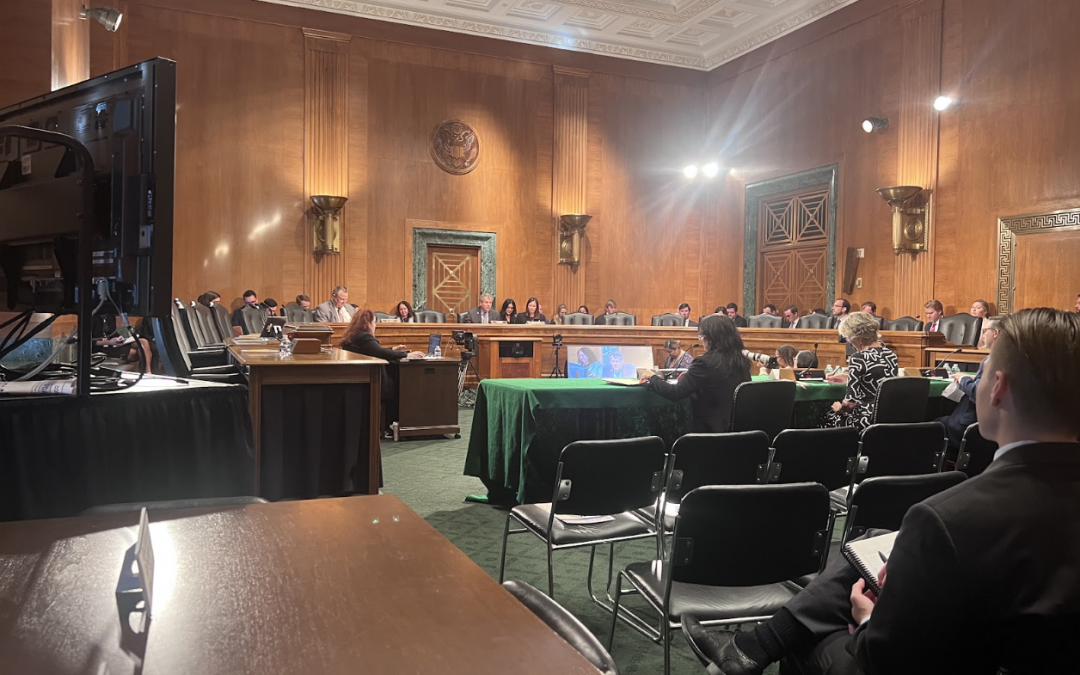WASHINGTON — Senators sparred over the most efficient ways to address the use of illicit finance networks funding terrorism in a Senate Committee on Banking, Housing, and Urban Affairs hearing Thursday.
The discussion largely focused on identifying and combating Iran’s alleged role in funding Hamas terrorism in Israel this month. Expert witness Dr. Matthew Levitt, the Director of the Reinhard Program On Counterterrorism & Intelligence for The Washington Institute for Near East Policy, said Iran sends $100 million to Hamas and $700 million to $1 billion to Hezbollah each year, according to a 2018 U.S. report.
The committee showed bipartisan support for frustrating these transactions, but the discussion often devolved into blame attribution for the attacks, mostly targeting President Biden, despite several senators’ calls for unity on the issue.
After Sen. John Kennedy, R-La., pursued a line of questioning pressing witnesses to agree to his assertions that the Biden administration is “soft” on Iran, thinks “love is the answer” and is “quoting Socrates in the middle of a prison riot,” Sen. Catherine Cortez Masto, D-N.M., said to “be candid” and “tell the facts,” one must acknowledge that previous decisions during the Trump administration, like pulling the U.S. out of the Joint Comprehensive Plan of Action (JCPOA) and refusing to impose sanctions on Qatar, also led to the current crisis.
“This really requires us to work in a bipartisan way without gotcha moments,” Cortez Masto said. “…There’s enough blame to go around. Let’s focus on where we are today.”
Chairman Sherrod Brown, D-Ohio, said the U.S. government’s responsibility should be to identify the bad actors and their money pipeline so it can “shut off their funding.”
Brown added that, in its response, Congress must address the non-traceable forums used by bad actors to facilitate the illicit transactions that have funded terrorist operations like those recently carried out in Israel by Hamas.
“We must undertake a more robust approach to identifying and preventing transactions that take place not only through financial institutions but also through trade-based money laundering, cryptocurrency transactions and other channels designed to avoid detection,” Brown said.
Several Republican committee members, including Sen. Bill Hagerty, R-Tenn., and Sen. Katie Britt, R-Ala., sounded the alarm about what they characterize as the Biden administration’s failure to properly enforce sanctions on Iran. One expert witness, Danielle Pletka, a distinguished senior fellow at the American Enterprise Institute, confirmed that enforcement of these sanctions had been relaxed leading up to the Oct. 7 Hamas attacks.
Sen. Bob Menendez, D-N.J., whose recent indictment alleges he conspired to act as a foreign agent of Egypt, a nation that plays a significant role in the region and borders Gaza, said he is concerned by the notion that sanctions on Iran, most of which he was a key author and architect of, are not being enforced.
Pletka posited that the lack of sanction enforcement from the Biden administration may have been rooted in its hope that the U.S. could have re-entered the JCPOA with Iranian cooperation. She added, however, that this is likely no longer the administration’s position in light of the recent war.
Much has been made of the $6 billion of Iranian funds unfrozen by the Biden administration in September, shortly before the war broke out. Indeed, while these funds are currently frozen again and held in a Qatari bank account in South Korea under American supervision, Republican lawmakers have implicated the White House in unsealing fungible funds Iran may have ultimately used to fund the Hamas attacks.
While these allegations are not factually substantiated and have been rebutted by the Biden administration itself, questions remain about Qatari interests and the future of these funds.
Menendez said the unfreezing of the funds should be conditioned on an Iranian commitment to cut all ties with Hamas. He suggested Iran’s denial of involvement in the Hamas attacks should not be trusted and a role in funding Hamas can be assumed.
“Hamas doesn’t have the intelligence and technological capability to launch such an operation,” Menendez said. “That can only come from a state actor, and the only state actor who would help Hamas is Iran.”
Sen. Steve Daines, R-Mont., was the last U.S. senator to speak with Prime Minister Benjamin Netanyahu before the war. He characterized President Biden’s foreign policy in Iran as an “appeasement strategy,” which he has found to be “unconscionable” and “dangerous.”
Daines added that Iran mostly uses funds from its oil exports to fund Hamas. He then echoed the common Republican assertion that Biden’s relaxation of sanctions on these exports allowed Iran to fund the attacks.
The senator has introduced legislation to repurpose the $6 billion in Iranian funding to support the defense of Israel. He also proposed a more harsh Iranian foreign policy stance moving forward.
“These rockets, missiles and other arms that these terrorists have, have to be funded somewhere, and they’re coming from Iran,” Daines said. “Why can’t the administration be clear on that and move away from trying to bring Iran to the table and instead bring Iran to its knees through a maximum pressure campaign.”
Senators will have one week to submit questions for the record, which witnesses will then have 45 days to answer as lawmakers continue to deliberate how to address illicit finance networks and the role they play in terrorism abroad.


